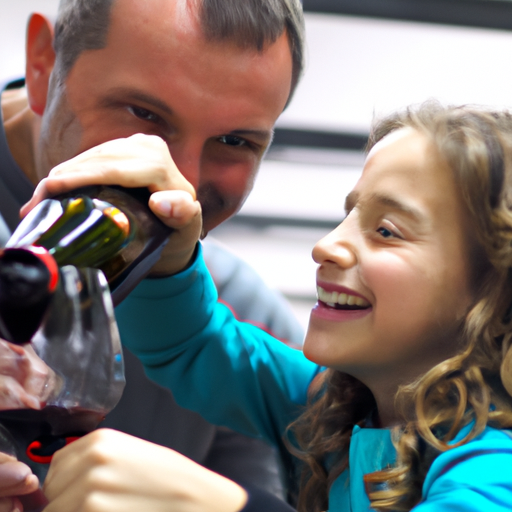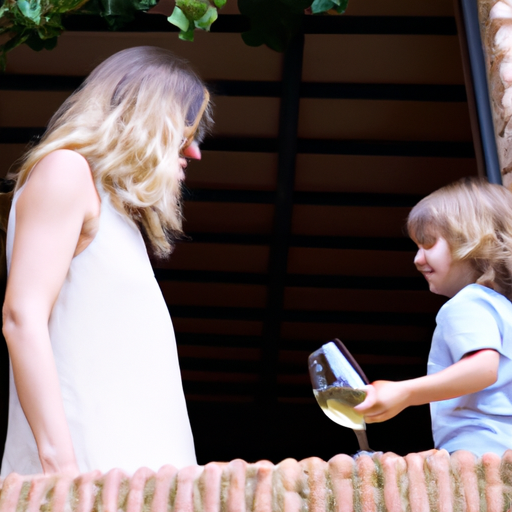
The Benefits of Wine Education for the Next Generation
The Benefits of Wine Education for the Next Generation
In today’s fast-paced world, where trends come and go in the blink of an eye, it can be challenging to persuade the next generation to embrace the timeless tradition of wine. However, there are numerous benefits to wine education that can help bridge the gap between generations and foster a deeper appreciation for this ancient beverage.
First and foremost, wine education provides a unique opportunity for young adults to develop their sensory skills. Wine tasting involves using all of our senses – sight, smell, taste, and even touch – to fully experience the complexities of different wines. By honing these skills, young adults can not only enhance their enjoyment of wine but also develop a greater appreciation for the nuances and subtleties that make each bottle unique.
Furthermore, wine education can also serve as a gateway to learning about different cultures and regions. Wine is deeply intertwined with the history and traditions of various countries, and exploring the world of wine can be a fascinating journey of discovery. From the vineyards of France to the wineries of California, each region has its own story to tell, and wine education allows young adults to immerse themselves in these narratives, broadening their horizons and fostering a sense of cultural appreciation.
In addition to sensory development and cultural exploration, wine education can also teach young adults valuable life skills. Wine tasting requires patience, attention to detail, and the ability to articulate one’s thoughts and impressions. These skills are not only useful in the context of wine but can also be applied to various aspects of life, such as developing a discerning palate, making informed decisions, and effectively communicating one’s opinions.
Moreover, wine education can also promote responsible drinking habits among the next generation. By learning about the different types of wine, their alcohol content, and the effects of alcohol on the body, young adults can make more informed choices when it comes to consuming alcoholic beverages. This knowledge can help them develop a healthier relationship with alcohol and avoid excessive or irresponsible drinking.
Furthermore, wine education can also foster a sense of community and social connection. Wine has long been associated with conviviality and shared experiences, and learning about wine can provide young adults with a common interest and a platform for socializing. Whether it’s attending wine tastings, joining wine clubs, or simply discussing and sharing their newfound knowledge with friends, wine education can help young adults forge meaningful connections and create lasting memories.
In conclusion, wine education offers a multitude of benefits for the next generation. From developing sensory skills and cultural appreciation to acquiring life skills and promoting responsible drinking habits, the advantages of wine education are far-reaching. By embracing wine education, young adults can not only deepen their understanding and enjoyment of wine but also cultivate a sense of curiosity, connection, and appreciation for the rich traditions and stories that surround this ancient beverage.
Exploring the Cultural Significance of Wine and Its Appeal to Younger Generations

Wine has long been a symbol of sophistication and refinement, with a rich history that spans centuries. However, in recent years, there has been a noticeable shift in the demographics of wine consumers. Younger generations, who were once more inclined towards beer and spirits, are now showing a growing interest in wine. This shift can be attributed to a variety of factors, including the cultural significance of wine and its appeal to younger generations.
One of the main reasons why wine is becoming increasingly popular among younger generations is its cultural significance. Wine has always been associated with celebration and special occasions. From weddings to anniversaries, wine is often the drink of choice for toasting and commemorating important milestones. This cultural significance has been passed down through generations, and younger individuals are now embracing wine as a way to connect with their heritage and participate in these time-honored traditions.
Furthermore, wine has a certain allure that appeals to the younger generation. It is seen as a sophisticated and elegant beverage, one that is often associated with luxury and indulgence. This appeal is further enhanced by the marketing efforts of wine producers, who have successfully positioned wine as a lifestyle choice. Wine tastings, vineyard tours, and wine clubs have become popular activities among young adults, providing them with an opportunity to explore different varieties and expand their knowledge of wine.
Another factor contributing to the growing interest in wine among younger generations is the health benefits associated with moderate wine consumption. Numerous studies have shown that moderate wine consumption can have positive effects on cardiovascular health, as well as provide antioxidant benefits. This knowledge has resonated with health-conscious millennials, who are increasingly seeking out products that offer both enjoyment and wellness benefits. Wine fits this criteria perfectly, making it an attractive choice for those looking to indulge in a guilt-free manner.
In addition to its cultural significance and appeal, wine also offers a wide range of flavors and styles that cater to the evolving tastes of younger generations. With the rise of the craft beer movement, young adults have developed a palate for complex and unique flavors. Wine, with its vast array of grape varieties and production methods, provides a similar level of complexity and diversity. From bold and robust reds to crisp and refreshing whites, there is a wine to suit every taste preference.
To further persuade the next generation to embrace wine, it is important to continue educating them about its history, production process, and the different regions that produce it. Wine education programs and events can help demystify the world of wine and make it more accessible to younger individuals. By providing them with the knowledge and tools to appreciate wine, we can foster a deeper appreciation and understanding of this ancient beverage.
In conclusion, the cultural significance of wine, its appeal to younger generations, and its health benefits are all contributing factors to the growing interest in wine among the next generation. By embracing wine, young adults are not only connecting with their heritage but also indulging in a sophisticated and diverse beverage. As the wine industry continues to evolve and adapt to the changing tastes of younger consumers, it is crucial to continue educating and engaging them in order to ensure the continued growth and appreciation of wine.
Strategies for Introducing Wine to the Next Generation in a Fun and Approachable Way
Persuading the Next Generation to Embrace Wine
Strategies for Introducing Wine to the Next Generation in a Fun and Approachable Way
Wine has long been associated with sophistication and elegance, but it is often seen as a drink for older generations. However, with the right strategies, it is possible to introduce wine to the next generation in a fun and approachable way. By focusing on education, experiential learning, and social events, we can help young adults develop an appreciation for wine and ensure its continued popularity for years to come.
Education is key when it comes to introducing wine to the next generation. Many young adults may not have had the opportunity to learn about wine growing up, so providing them with the knowledge they need is essential. This can be done through wine tasting classes, workshops, or even online resources. By teaching them about different grape varieties, wine regions, and the art of wine tasting, we can help young adults feel more confident and knowledgeable about wine.
Experiential learning is another effective strategy for introducing wine to the next generation. Instead of simply lecturing about wine, it is important to provide opportunities for young adults to experience it firsthand. This can be done through winery tours, where they can see the winemaking process up close and even participate in grape harvesting or wine blending activities. By immersing themselves in the world of wine, young adults can develop a deeper appreciation for the craft and the effort that goes into producing each bottle.
In addition to education and experiential learning, social events can also play a crucial role in introducing wine to the next generation. Wine tastings, wine and food pairing dinners, and wine festivals are all great opportunities for young adults to try different wines in a relaxed and social setting. These events can be designed to be fun and interactive, with knowledgeable sommeliers or wine experts on hand to guide participants through the tasting experience. By creating a welcoming and inclusive atmosphere, we can help young adults feel comfortable exploring the world of wine.
It is also important to consider the preferences of the next generation when introducing wine. Many young adults are drawn to natural and organic products, so highlighting wines made from sustainable or biodynamic practices can be appealing. Additionally, the rise of craft beer and cocktail culture has made young adults more open to trying new and unique flavors. By showcasing wines with interesting flavor profiles or innovative winemaking techniques, we can capture their attention and pique their curiosity.
Furthermore, technology can be a powerful tool in engaging the next generation with wine. Social media platforms, such as Instagram and YouTube, can be used to share educational content, wine recommendations, and stories from winemakers. Virtual wine tastings and online wine clubs can also provide young adults with the opportunity to connect with other wine enthusiasts and learn from experts, even if they are unable to attend in-person events.
In conclusion, persuading the next generation to embrace wine requires a multifaceted approach. By focusing on education, experiential learning, social events, and catering to their preferences, we can make wine more accessible and appealing to young adults. With the right strategies in place, we can ensure that wine remains a beloved and cherished beverage for generations to come.






